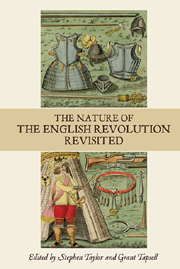Book contents
- Frontmatter
- Contents
- Preface and Acknowledgements
- List of contributors
- List of Abbreviations
- 1 Charles I and Public Opinion on the Eve of the English Civil War
- 2 Rethinking Moderation in the English Revolution: The Case of An Apologeticall Narration
- 3 The Parish and the Poor in the English Revolution
- 4 Body Politics in the English Revolution
- 5 The franchise Debate Revisited: The Levellers and the Army
- 6 Oliver Cromwell and the Instrument of government
- 7 ‘de te fabula narratur’: The Narrative Constitutionalism of James Harrington's Oceana
- 8 Democracy in 1659: Harrington and the Good Old Cause
- 9 The Restoration of the Church of England, 1660–1662: Ordination, Re-ordination and Conformity
- 10 Style, Wit and Religion in Restoration England
- 11 A British Patriarchy? Ecclesiastical Imperialism under the Later Stuarts
- Index
- Studies in Early Modern Cultural, Political and Social History
5 - The franchise Debate Revisited: The Levellers and the Army
Published online by Cambridge University Press: 05 July 2013
- Frontmatter
- Contents
- Preface and Acknowledgements
- List of contributors
- List of Abbreviations
- 1 Charles I and Public Opinion on the Eve of the English Civil War
- 2 Rethinking Moderation in the English Revolution: The Case of An Apologeticall Narration
- 3 The Parish and the Poor in the English Revolution
- 4 Body Politics in the English Revolution
- 5 The franchise Debate Revisited: The Levellers and the Army
- 6 Oliver Cromwell and the Instrument of government
- 7 ‘de te fabula narratur’: The Narrative Constitutionalism of James Harrington's Oceana
- 8 Democracy in 1659: Harrington and the Good Old Cause
- 9 The Restoration of the Church of England, 1660–1662: Ordination, Re-ordination and Conformity
- 10 Style, Wit and Religion in Restoration England
- 11 A British Patriarchy? Ecclesiastical Imperialism under the Later Stuarts
- Index
- Studies in Early Modern Cultural, Political and Social History
Summary
Can there be anything left to say about the so-called franchise debate? It is now fifty years since C. B. Macpherson, in a provocative chapter in The Political Theory of Possessive Individualism, controversially rejected the traditional view of the Levellers as advocates of universal male suffrage. Based on his reading of the Putney debates and the Levellers' pamphlets and petitions, Macpherson argued that the Levellers consistently supported restrictive franchise proposals that would have excluded all those who, in their opinion, had forfeited their birthright by alienating their property in their labour: namely, beggars, almsmen and servants, with Macpherson taking the latter term to mean all persons receiving wages. What underlay these exclusions, he contended, was the Levellers' acceptance of the values of a possessive market society, one in which true freedom - and hence the right to vote - is contingent upon full economic independence and the proprietorship of one's own person and capacities. The subsequent scholarly debate over Macpherson's thesis generated a vast amount of often highly tendentious literature and rumbled on well into the 1980s. Although his arguments found some initial support, this soon gave way to their trenchant rejection by the vast majority of commentators, who raised a number of common objections.
- Type
- Chapter
- Information
- The Nature of the English Revolution Revisited , pp. 103 - 122Publisher: Boydell & BrewerPrint publication year: 2013

